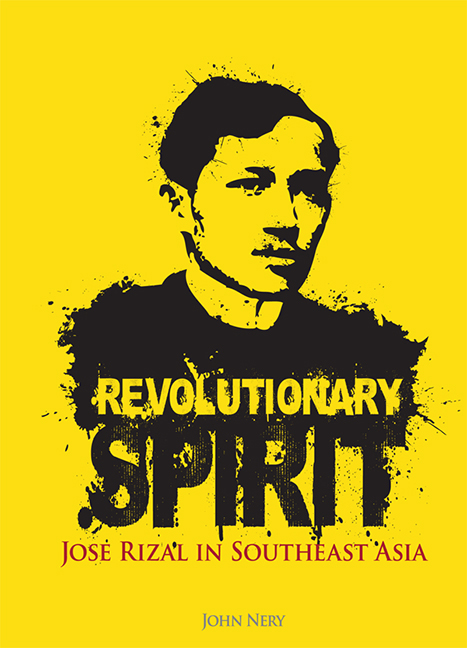Book contents
- Frontmatter
- Dedication
- Epigraph
- Contents
- Foreword
- Message
- Preface
- Acknowledgements
- INTRODUCTION The Uses of Error A Rizal Chronology
- 1 TURNING POINTS
- 2 “THE VERY SOUL OF THIS REBELLION”
- 3 DOCTOR RIZAL
- 4 “HALFBLOED”
- 5 “NO MARX OR LENIN”
- 6 UNDER THE SOUTHERN SUN
- 7 THE HOPE OF MILLIONS IN ASIA
- 8 “HIS NAME IS SWEET IN OUR MEMORY”
- 9 THE MYTH BUSTERS
- 10 “A GREAT HISTORICAL EXPERIMENT”
- Epilogue
- Appendices
- A A Man of Letters
- B Falling for the American Trap
- C “Colour and Scent, Light and Sound”
- References
- Index
C - “Colour and Scent, Light and Sound”
from Appendices
Published online by Cambridge University Press: 21 October 2015
- Frontmatter
- Dedication
- Epigraph
- Contents
- Foreword
- Message
- Preface
- Acknowledgements
- INTRODUCTION The Uses of Error A Rizal Chronology
- 1 TURNING POINTS
- 2 “THE VERY SOUL OF THIS REBELLION”
- 3 DOCTOR RIZAL
- 4 “HALFBLOED”
- 5 “NO MARX OR LENIN”
- 6 UNDER THE SOUTHERN SUN
- 7 THE HOPE OF MILLIONS IN ASIA
- 8 “HIS NAME IS SWEET IN OUR MEMORY”
- 9 THE MYTH BUSTERS
- 10 “A GREAT HISTORICAL EXPERIMENT”
- Epilogue
- Appendices
- A A Man of Letters
- B Falling for the American Trap
- C “Colour and Scent, Light and Sound”
- References
- Index
Summary
Colour and Scent, Light and Sound
In 1944, the 22-year-old journalist Rosihan Anwar was a frequent visitor to the Jakarta Museum. “My main interest at that time was not very specific. I just liked books, whatever I could lay my hands on at the time,” he said in a lengthy interview (Rosihan 2010b). “[Because of] the situation, the Japanese occupation, there were no books [for sale] anymore.”
So it was the library for him. One day, late in the year, he was browsing through a book on the Philippines — then very much in the news. “Surprisingly enough, as I read the book, I saw the poem [of Rizal's]. In Spanish. ‘Adios Patria Adorada.’ [the poem's famous opening line]. ‘Mi Ultimo Pensamiento’ or something [the poem's first title, meaning My Last Thoughts]. I don't understand Spanish …. [But] as I read further, I saw the translation [in English].”
He had found the most famous poem in Philippine history. It is pleasing to imagine the scene: a newspaper reporter and occasional poet, active in the pemuda or militant youth networks of the time, stopped in his tracks by a martyr's poem. He decided, then and there, to translate it into Indonesian.
“The situation was favourable to promote nationalism. In that context, I thought it would be good that I could disseminate this story about Jose Rizal among our younger people at that time. It was quite natural. I thought it would be good to tell the story of Jose Rizal, this rebel against the Spanish. And of course the climax, when he was already sentenced to death and then hauled off to face the firing squad, and he wrote that [poem] …”
Three sources of Rosihan's translation of “Mi Ultimo Adios” may be considered to carry some authority — the 30 December 1944 issue of Asia Raya, published in Jakarta, in which the translation first appeared; the paper “Rizal's Name in Indonesia,” which Rosihan contributed to the International Congress on Rizal, in Manila, and from which he read excerpts on 7 December 1961; and the proceedings of the International Conference on the Philippine Revolution and the First Asian Republic, held in Jakarta in August 1997.
- Type
- Chapter
- Information
- Revolutionary SpiritJose Rizal in Southeast Asia, pp. 249 - 256Publisher: ISEAS–Yusof Ishak InstitutePrint publication year: 2011



